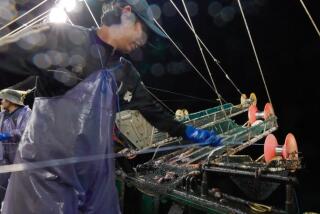Peace in the Pacific
- Share via
A tuna treaty, covering 16 nations and about 10 million square miles of South Pacific waters, has been successfully negotiated by the State Department, ending bitter disputes that had led to the seizure of two U.S tuna vessels and closing the door on what had seemed a rare opportunity for the Soviet Union to enhance its influence in a sensitive area.
The sharp divisions that had separated the American government and the U.S. tuna industry from the 16 nations that make up the South Pacific Forum have been resolved through two years of painstaking negotiations. The result is agreement on the part of the U.S. fishermen to pay at least $2 million a year to the South Pacific nations, and for the American government, outside the terms of the treaty itself, to contribute $10 million in each of the next five years to the Pacific nations and to provide a substantial development-assistance package. It is a small price to pay for the resources and security involved.
Diplomats drawing up the arrangements have sought to avoid prejudicing either the U.S. position, opposing the Pacific nations’ claim to tuna-fishing authority beyond 12 miles, or the claim of the 16 nations to fishing zones extending 200 miles. The United States has been on weak ground, however, ever since it imposed its own 200-mile exclusive economic zones covering marine resources other than tuna.
In strategic terms the agreement cut short Moscow’s first successful negotiation of special arrangements in the South Pacific with Kiribati. Moscow also has established diplomatic relations with Vanuatu. Both of those entities have now initialed the new pact with the United States and do not plan any further special arrangements with the Soviet Union. This will reassure military planners who had been concerned that the Soviet Union might exploit disagreements between the Pacific nations and Washington to gain a foothold that might be extended to be of strategic usefulness.
Ambassador Edward E. Wolfe, deputy assistant secretary of state for oceans and fisheries affairs, led the U.S. negotiators. Among the key persons helping was David Burney, general counsel of the Tuna Foundation in Washington. Both have hailed the agreement as a major foreign-policy breakthrough. So it seems to be.
The agreement also is a measure of the risks taken when the United States refused to sign the law-of-the-sea treaty that set a broad context for this very sort of cooperative negotiation. There had been a stubbornness on the part of some Americans willing to assert their own claim to the Gulf of Alaska fisheries but reluctant to accept a similar claim from the South Pacific nations.
Senate confirmation is expected early in the new year, with the 16 Pacific nations expected to follow suit so that the arrangements can be implemented by summertime.
More to Read
Sign up for Essential California
The most important California stories and recommendations in your inbox every morning.
You may occasionally receive promotional content from the Los Angeles Times.












